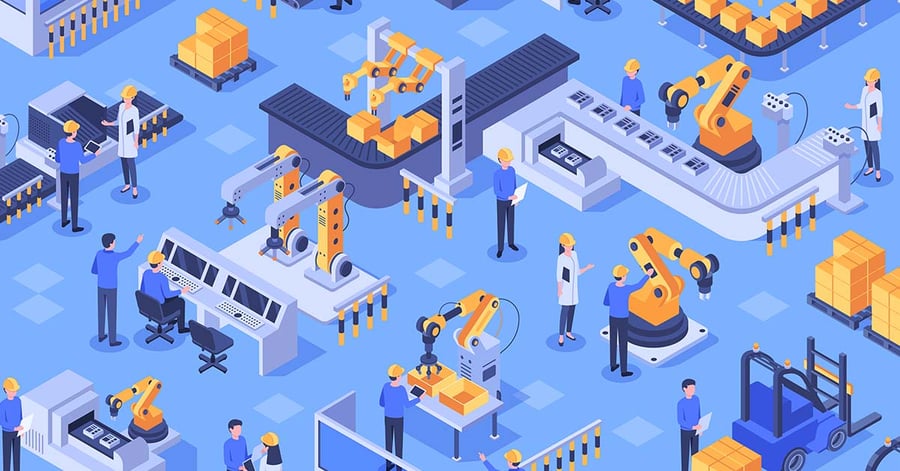
How Modern Manufacturing ERP Systems Address Key Industry Challenges
Manufacturing ERP Challenges & Modern ERP Solutions
6:53
Published :

Ever since the pandemic, the manufacturing and distribution industry has been facing challenges such as operational inefficiencies, supply chain disruptions and the heightened need for remote collaboration. Additionally, businesses need to prepare for some long-term challenges, including new competitors in the market, new customer-centric business models, and an increased need for predictive data.
Advanced technology such as Manufacturing ERP (Enterprise Resource Planning) could help combat these challenges. Many companies, including your competitors, are opting for an ERP system designed to revolutionize business operations on an integrated and real-time basis.
Here's how modern manufacturing ERP systems help address challenges that manufacturing companies face.
You might be already familiar with industry disruptors like Netflix (which disrupted the traditional entertainment industry) and Uber (which disrupted the taxi business). These innovative start-ups entered the market with new customer-centric business models that replaced the traditional business models. They had a good understanding of the evolving customer needs. It is obvious that such disruptors have been rising in the manufacturing industry as well. The world has witnessed that the manufacturing sector hasn’t been able to be as agile as it should have been during the pandemic. Manufacturers weren’t quick enough to respond to customer requirements and industry disruptions by simply relying on manual processes and legacy systems. This led to the rise of small and niche players who could address the customer needs directly with the aid of emerging technology that offered the right capabilities to compete in the market.
Replacing the manual systems with an ERP for manufacturing solution will benefit in many ways, including improving the visibility of critical data, reducing waste, increasing productivity, lowering production costs, and improving schedule management and production rates. Accurate and real-time inventory data visibility will give your business a competitive edge.
The pandemic also opened the door for many eCommerce opportunities highlighting the importance of digital customer experience. In addition to initiating digital strategies including digital supply chains and remote working, several B2B businesses also made use of APIs to plug into eCommerce platforms like Amazon to widen the supply chain even further. This is to say, these businesses have 24*7 access to the customer base and the ability to collect customer data in order to improve operational efficiency.
Now the customers and not the production efficiency will decide the future of a manufacturer. Keeping this in mind, implementing an ERP for manufacturing solution will make you digitally capable of growing while providing a better customer experience. Not only does it allow integration with other platforms, but it also eliminates the need for downtime planning and managing physical updates. This shows the power of ERP for manufacturing in transforming business operations and meeting the challenges of the modern manufacturing landscape.
In the last few years, the manufacturing industry has faced supply chain disruptions resulting in little to no ability to predict future developments. Connectivity and real-time data analysis are crucial for increased visibility across the supply chain to ensure that the right levels of inventory are ordered and delivered at the right price and in the right quantities. Thus, data has become a deal-breaker in ensuring supplier and customer success.
As manufacturing evolves toward Industry 4.0, the integration of AI (Artificial Intelligence) and IoT (Internet of Things) with manufacturing ERP systems is reshaping operational excellence and strategic decision-making. Businesses are no longer confined to reactive processes, instead, they are leveraging real-time data, predictive analytics, and automation to gain a competitive edge. The adoption of ERP for manufacturing is now seen as a catalyst for digital transformation and long-term sustainability.
Modern manufacturing ERP platforms embedded with AI capabilities enable manufacturers to forecast demand, optimize production schedules, and minimize human error. Predictive analytics within ERP for manufacturing reduces machine downtime, identifies supply chain risks, and ensures optimal inventory levels. This empowers organizations to make data-backed decisions quickly, without relying on manual research or fragmented data sources.
IoT-enabled manufacturing ERP systems connect machines, sensors, and inventory modules to offer real-time tracking across production floors. This level of connectivity ensures that manufacturers have complete visibility into performance metrics, energy usage, and potential equipment failures. When integrated with ERP for manufacturing, IoT can automatically trigger workflows such as purchase requisitions or maintenance schedules, enhancing operational agility.
Regulatory compliance and quality control are becoming increasingly complex in the manufacturing ecosystem. A robust manufacturing ERP platform enables traceability, standardization of processes, and audit readiness. By deploying ERP for manufacturing, organizations can scale globally while maintaining consistent quality metrics and meeting industry-specific regulatory requirements.
Manufacturers have learned that it is easier to leverage large quantities of data received from inventories, connected factory sensors, and signals along the supply chain. ERP for manufacturing facilitates businesses to work with real-time data while automating processes. Integration of operations into an ERP for manufacturing platform ensures manufacturers' connectivity, agility and the ability to transform their business for long-term sustainability.
Technologically advanced ERP for manufacturing solutions from a trusted ERP software company are necessary for your company's manufacturing operations, intelligence, efficiency and productivity. Every aspect of a modern manufacturing ERP system enables your business to become more competitive, productive and better positioned to meet customers' needs.
Modern manufacturers face supply chain disruptions, market volatility, and rising customer expectations. ERP systems integrate operations, finance, inventory, and production in real-time, offering better visibility, operational efficiency, and cost optimization. By leveraging ERP, manufacturers can respond faster to market changes, reduce downtime, and stay competitive in a globalized, digitally-driven manufacturing landscape.
ERP systems enable manufacturers to pivot from B2B to B2C by integrating with eCommerce platforms, APIs, and digital supply chains. They provide real-time customer data, streamline order processing, and enhance digital customer experiences. This agility ensures manufacturers can meet changing consumer demands while optimizing operations, inventory, and fulfillment across multiple sales channels.
AI and IoT integration in manufacturing ERP platforms transforms operational decision-making. AI enables predictive analytics, demand forecasting, and production optimization, while IoT provides real-time visibility of machines, inventory, and energy usage. Together, they enhance automation, reduce human error, and enable proactive maintenance, giving manufacturers a competitive edge and operational agility in the Industry 4.0 era.
ERP systems consolidate data across the supply chain, offering real-time insights into inventory levels, production schedules, and supplier performance. By integrating predictive analytics, manufacturers can make data-driven decisions, reduce stockouts or overproduction, and respond to disruptions faster. Enhanced visibility empowers businesses to optimize costs, improve service levels, and maintain supply chain resilience globally.
ERP platforms enable manufacturers to standardize processes, ensure traceability, and maintain audit readiness across operations. They support global scalability by automating workflows, tracking quality metrics, and ensuring compliance with industry-specific regulations. Manufacturers can scale efficiently without compromising quality, reduce operational risks, and maintain consistent standards while expanding into new markets or production lines.
ERP systems provide real-time production and inventory data, enabling manufacturers to identify inefficiencies, minimize overproduction, and reduce material waste. By optimizing workflows, scheduling, and resource allocation, ERP lowers labour and energy costs while improving throughput. This leads to a leaner, more sustainable operation, boosting profitability and competitiveness in local and international markets.
Yes. ERP platforms integrated with IoT sensors monitor machine health in real-time, triggering predictive maintenance alerts before failures occur. AI-driven analytics anticipate potential breakdowns, reducing unplanned downtime and repair costs. This proactive approach ensures continuous production, improves operational efficiency, and extends equipment lifespan, supporting manufacturers in achieving consistent output and profitability.
ERP systems centralize operational, inventory, and customer data, enabling manufacturers to make informed, data-driven decisions. Analytics dashboards provide insights on performance, costs, and demand trends. With real-time visibility, managers can anticipate disruptions, optimize production, and align strategies with business objectives, ensuring agility, efficiency, and competitiveness in complex global manufacturing environments.

All Rights Reserved. © Copyright 2024. Ramco Systems.